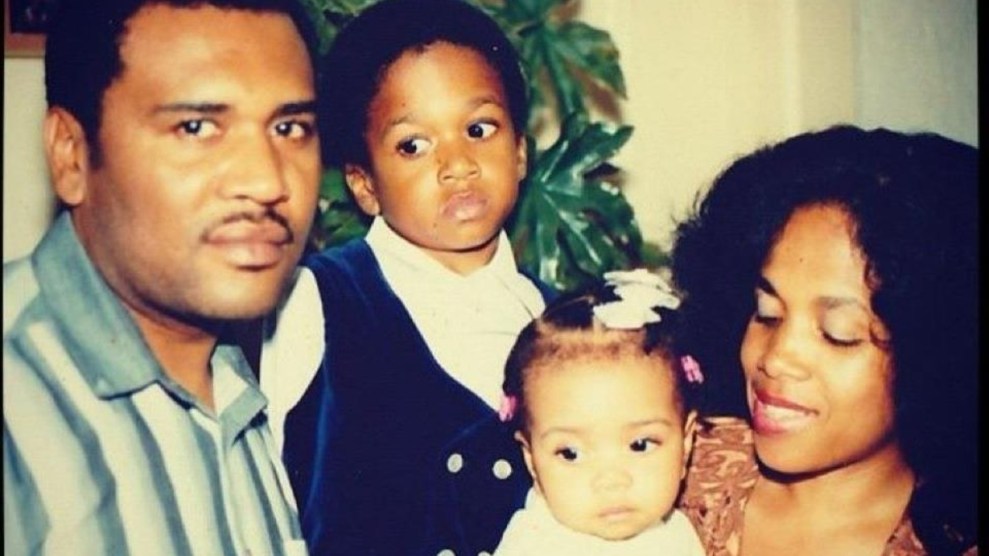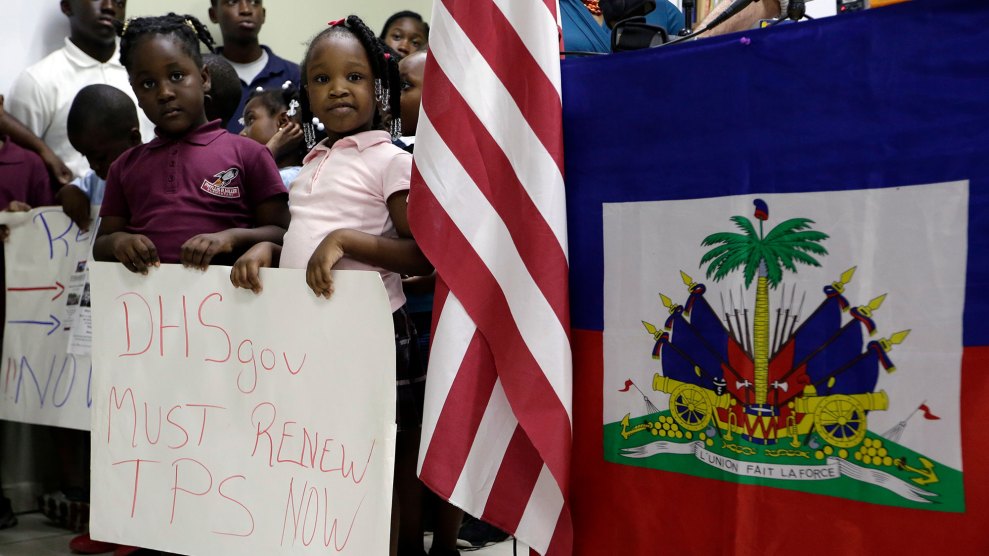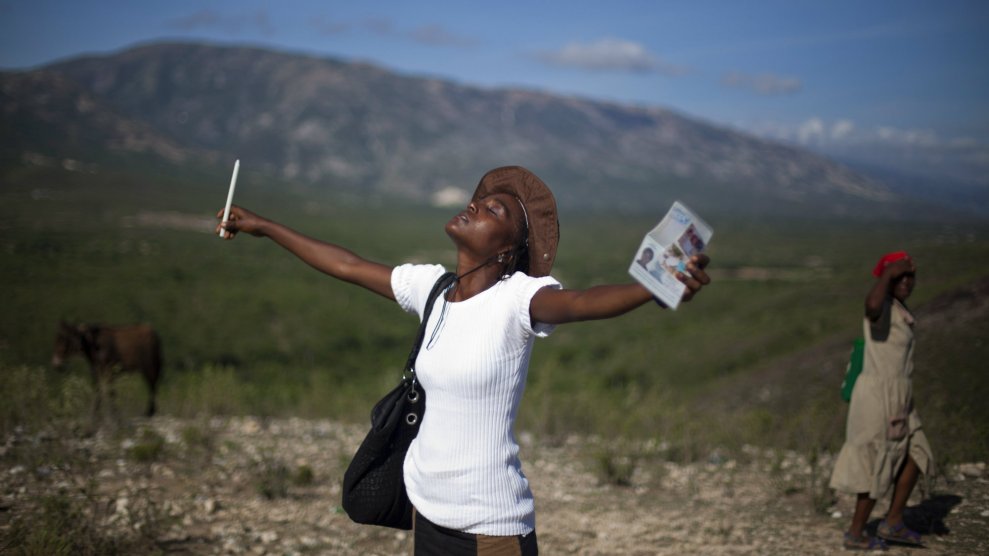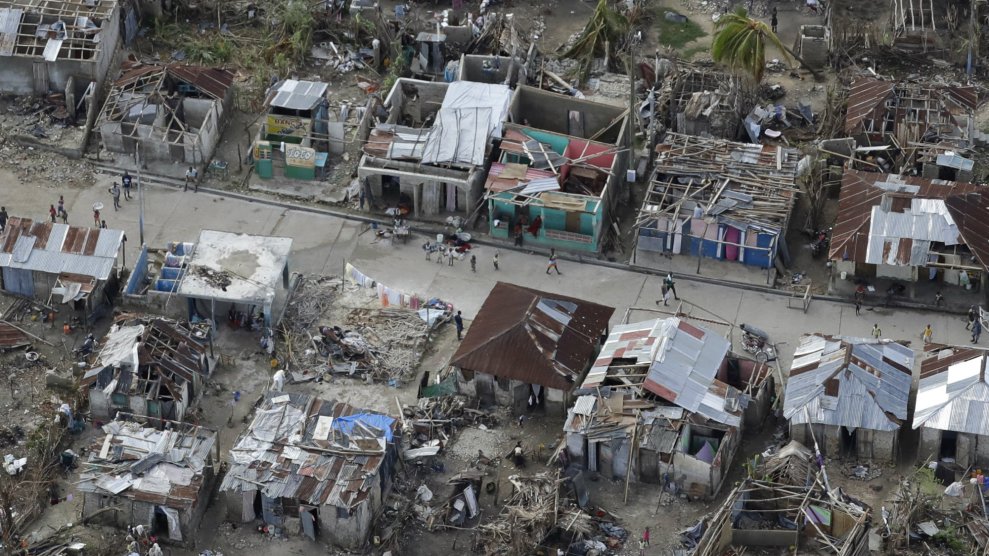
The author with her parents and brother in 1989Nathalie Baptiste
One week ago, like everyone else in the world, I awoke to the news that Jovenel Moise, the president of Haiti, had been assassinated in his home. Even though he was not a hugely popular leader and was facing increasing demands from his opponents to step down because, they argue, his five-year term should have ended earlier this year—not to mention the fact that violence between different political factions had been increasing—I was still surprised. Haiti may have experienced a lot of instability over the last two centuries, but a presidential assassination has not taken place since 1915 when President Vilbrun Guillaume Sam was beaten and hacked to death by his political opponents. Following his passing, US President Woodrow Wilson sent American troops who occupied the nation until 1934, a remnant of the island’s history as a French colony.
Still, I was startled by the iPhone notification the morning of July 7, and I rushed through my usual routine so I could call my Haitian-born and raised parents, whom I knew would be even more shocked than I. I didn’t want to talk to my parents about policy and government, or their theories about the events that led up to Moise’s killing. I wanted to know how they were processing the news, and what it’s like to be so far away from the place you call home—especially at a time like this.
“You heard the news?” my dad asked, practically without saying hello. Apparently, they’d been up before the sun fielding phone calls from relatives and friends in Haiti and in the US. And they weren’t alone. I could only imagine the hundreds of thousands of similar conversations among Haitian immigrants and their American-born children that were occurring. Immigrant communities are like that—whether in the midst of the COVID crisis in India or the anti-government protests in Colombia—when something happens back home, it’s all anyone in the emigré community can discuss.
The obligatory phone call was just the beginning. A few days after the assassination, I headed over to my parent’s house for a longer chat. They are in their 60s but don’t look that much different from when they first arrived in the United States in the early eighties (see above). At the big dining room table, Marie-José and Jean Remy, who go by José and Remy, reflected on their Haitian identity in a time of upheaval.
My father was born in Hinche, which is in Haiti’s central plateau region, about 68 miles away from the capital city of Port-au-Prince where my mother grew up. They came of age during the deadly dictatorship of François “Papa Doc” Duvalier and left—my father in 1980, my mother in 1981—after he died and was succeeded by his son, Jean-Claude “Baby Doc” Duvalier. The Duvaliers ruled from 1957 until 1986—nearly thirty years of political repression. My parents have fond memories of feeling safe growing up during that era—but are well aware that that illusion of safety was because any dissent or unrest was met quickly and with often brutal force. My mother once told me that as a child she mentioned something positive about Communism, and her father warned her that it would be dangerous to talk like that in public.
Like countless immigrants before and after them—which includes about 3 million Haitians in the diaspora—they came to the United States seeking economic security that just wouldn’t have been possible at home. They met in Brooklyn, New York, where my brother and I were both born, before settling in the suburbs of Washington, DC in the early 1990s. They are American citizens and have spent four decades in the US, but Haiti has never stopped being home. I grew up eating all of the best Haitian food, celebrated traditions like eating soup joumou on Haitian Independence Day, taking soccer very, very, seriously, and speaking Haitian Creole. Depending on the political situation, we’d try to take trips to Haiti as frequently as possible.
“The history of the world is the history of Haiti,” my dad said to me when I asked him about the importance of Haitian history. In 1791, the enslaved people in the French colony of Saint-Domingue began a 13-year uprising. In 1804, the enslaved people of Haiti finally defeated France. Not only did the Haitian rebellion push France and Britain to emancipate their slaves, but it also caused French Emperor Napoleon Bonaparte to abandon his desire to expand France’s foothold in the New World. He struck a deal with the US and sold the Louisiana Purchase, the land that would eventually comprise 15 states.
Haiti was the first independent Black nation on earth, and for that, my father asserts, they’re still paying the price. As far as he’s concerned, after the formerly enslaved people rose up to drive their colonizers out of the country, “The rest of the world has never forgiven Haiti for that.” In 1825, the French demanded reparations to the tune of 150 million francs (which was later reduced to 90 million) for “property loss” (a.k.a. slaves) and Haiti did not finish paying off this so-called debt until 1947. Then there was all the debt accrued from the international community, some of it by the Duvalier regime.
Not only was the country saddled with this external debt, but the United States also refused to recognize Haiti as an independent country until President Abraham Lincoln did so in 1862. This refusal to recognize Haiti’s independence coupled with its payments to France severely hindered the country’s economic growth and establishment of institutions, thereby setting the stage for what seems like continuous political and economic calamity.
But some of the most tragic calamities were natural disasters. In the forty years my parents have lived in the US, they’ve watched their country go through a relentless series of cataclysms. Between 1988 and 2004, there were four coups. In 2008, four hurricanes and tropical storms hit the island, killing approximately 800 people. In January 2010, a 7.0 magnitude earthquake struck the island, killing hundreds of thousands of people and displacing millions more. That same year, the United Nations unintentionally introduced cholera in Haiti but then refused to take responsibility for years afterward. It was against this backdrop of the chaos of recent Haitian history that Moises was killed. “You feel powerless,” my dad says, “because whether you’re here or there, there’s nothing you can do.” Mom agrees. “Sometimes, I feel like there is no hope in Haiti.”
Whenever there is a crisis in Haiti, a clear split emerges between Haitians who have left the country, but feel deeply connected, and those who still remain. Why should Haitians who’ve spent more time living in the states than in Haiti, have so many deeply held opinions about what happens back home? Why do they still feel deeply engaged with what happens there?
“You never detach from your country,” Dad explains. “There is no Haiti without the diaspora. When someone is sick, they call you. When someone needs money for school, they call you.” The United States estimates that the Haitian diaspora sends about $3 billion in remittances each year. We still have family in Haiti, and my parents frequently send money for the needs of our loved ones. As much as the food and the language, my parents’ strong sense of duty to friends and family back home keeps them connected.
Like any other family, the people back home have varying opinions on the political situation in Haiti. But regardless of your feelings of the late president, or the opposition groups, or even the role the US plays in Haitian politics, the assassination sparked renewed fear and confusion.
The political turmoil, the confusion, the lies—it all sounds so familiar. The first few days after the assassination, social media platforms like WhatsApp and YouTube were flooded with a torrent of misinformation. “Fake news is killing Haiti,” Dad declares. My mother weighs in, “Anyone can say anything on YouTube,” she says, “and it just spreads.” Mom says. (This does not surprise me.)
So what were the most outlandish rumors they’d heard so far? The recurring theme seemed to be that Moise was still alive, but there were lots of ways to get to that dubious conclusion. My dad’s nomination for the craziest conspiracy theory came from a Haitian pastor, in the US diaspora, who told his devoted congregation that Moise wasn’t assassinated at all. Instead, Satan had taken him as revenge for the rising violence across the country. “People really, really believe in their religion,” Dad says. “And when you have a charismatic pastor, you can do a lot of damage.” (Incidentally, a Florida-based Haitian pastor has been arrested in connection with the assassination. Authorities allege he helped recruit the gunmen who are accused of killing Moise.)
My parents had also seen on YouTube and WhatsApp that Moise had been kidnapped by some shadowy figure and was taken into exile. This kind of combination of superstition and religion was one reason that Haiti can be so disparaged by some in the US (See Donald Trump: “Shithole countries“). But how different is this from our very own US social media fever swamp?
The internet is so clogged with deceptions, that even my parents who consider themselves well-informed find it hard to navigate what’s true, what’s false, and who has whose interests at heart. Why would Colombian mercenaries with connections to a Miami-based security firm want to kill Moise? Did the United States have a role to play? And who is really in charge of the government now? My mother, however, has no doubts about one political reality: “What Trump did was worse than what’s happening in Haiti right now.”
I keep thinking of my father’s observation of how the history of Haiti is the “history of the world.” On January 6, friends and family in Haiti frantically called my parents to ask if we were okay. Even when my dad explained that I live a few miles from the Capitol building, and they live in suburbs, they weren’t convinced. If anyone understands political chaos, it’s Haitians. And throughout the years of Donald Trump’s presidency, my family and I made many comparisons between his actions and what plenty of Haitian political actors had effectively done before.
“You see the same things,” Dad says. “It’s the same lies and the same diversions.” In Haiti, power-hungry right-wing groups “try to scare people away from voting,” Dad says. “Now, look at Texas. The Republicans are trying to do the same thing there.”
My mother wishes she could spend more time talking about Haiti when there isn’t a crisis. “Only when there’s a disaster, that’s when people want to know about Haiti,” Mom laments. The questions always sound the same too. Why is there constant turmoil? Why are institutions continually failing the people? Who will decide Haiti’s future?
When my mother first arrived in the States, she was nearly 30 years old and worked under-the-table jobs to make ends meet. Even though she met my dad and had two kids, she would dream about returning. “I used to always think that once I turned 50 years old, I’d go home,” she tells me.
“We all came here thinking we’d go back,” my dad says. “The desire to go home is always there.” But with everything that’s going on, they’ll stay put. They’ll postpone visits until family and friends say the trip is worth it. For now, from just hundreds of miles away, all they can do is worry, wait, and wonder.













